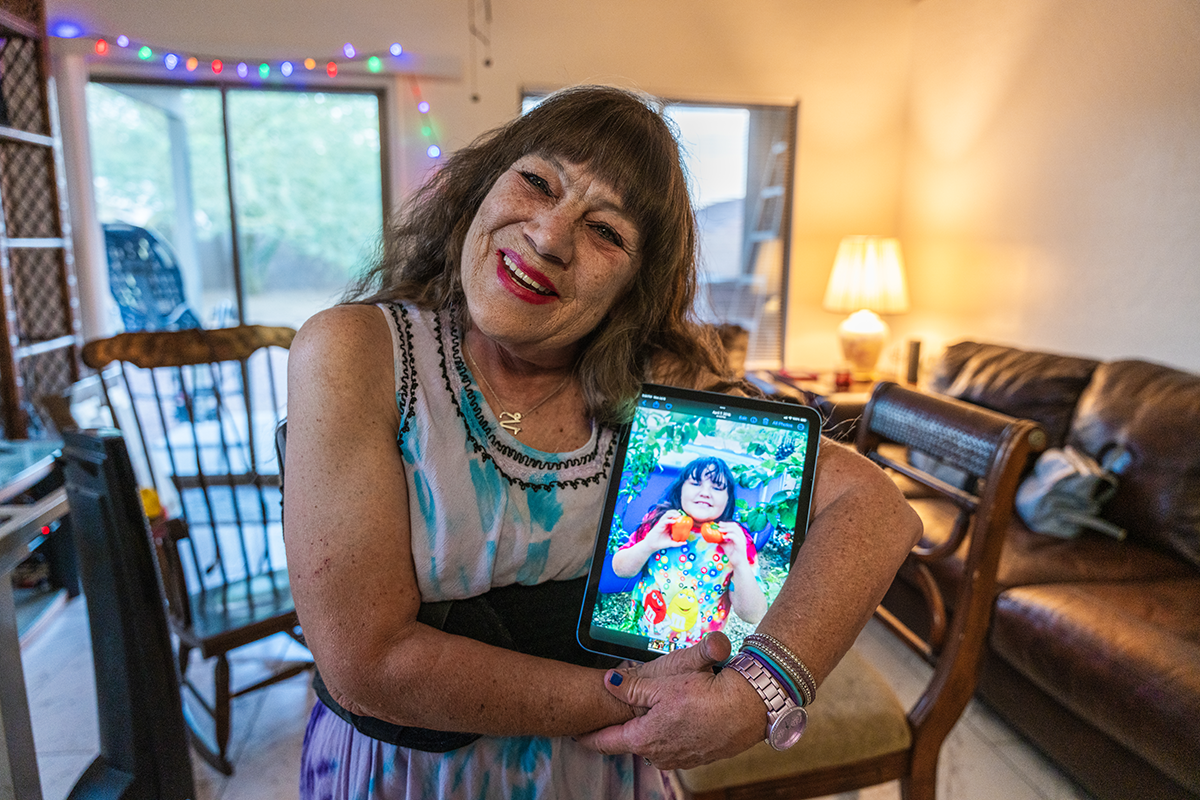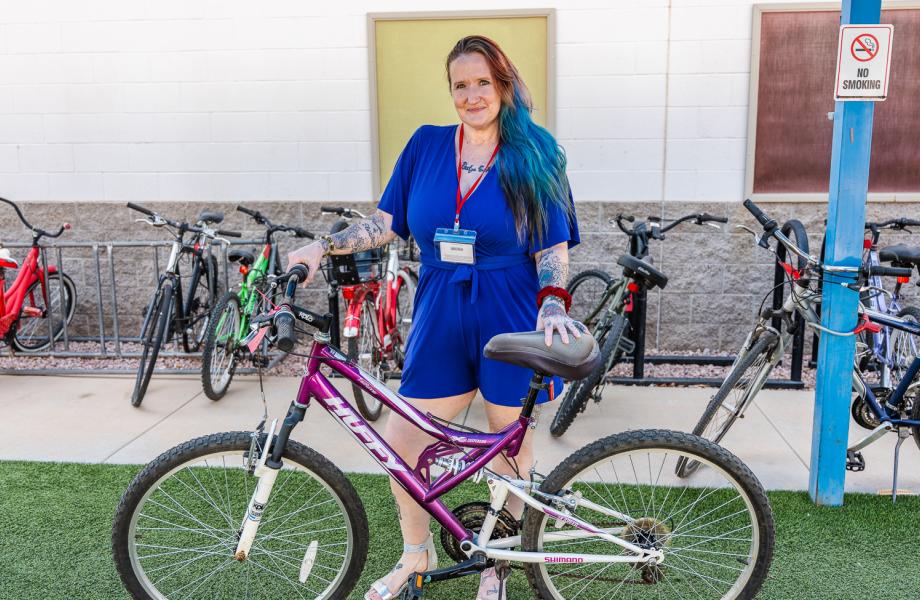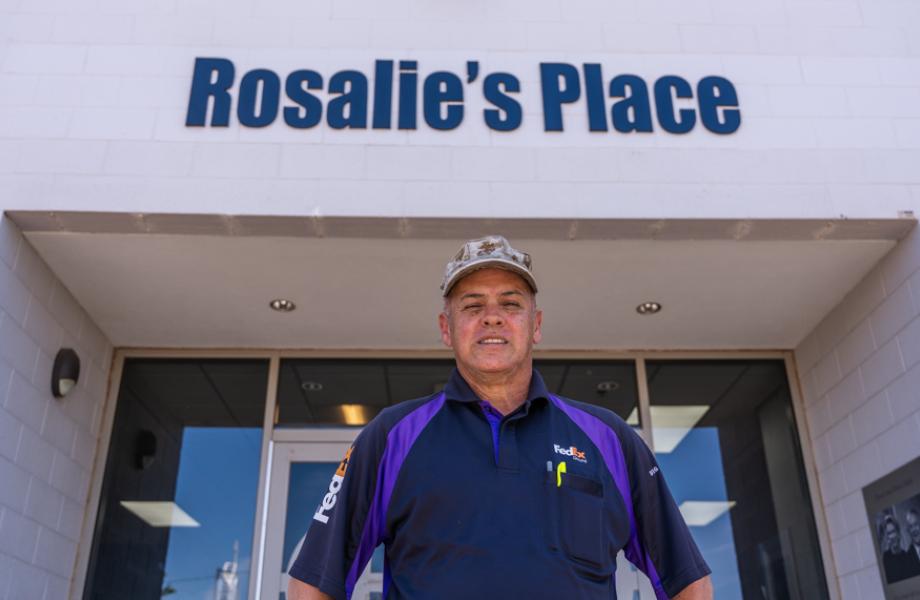Home again after a terrible accident and eviction
All DD Brown remembers is a flash of green light on the lefthand side of her car. It was 2021, and she and her daughter, Guinevere, were at a full stop after backing out of a parking space when suddenly a drunk driver sped backward through the parking lot and T-boned them.
The accident broke DD’s neck and pinched her spinal cord in such a way that she felt electrical shocks in her body in the days that followed the accident . Slowly she began to lose feeling as paralysis set in, spreading from her neck to her arms and legs.
“I didn’t know it yet, but I would be paralyzed for a year,” DD says, “and it would take me a year to learn to walk again and another six months to learn to write.”

Guinevere was just 16 at the time and also sustained major injuries that have her in physical therapy to this day. Right after the accident, neither DD nor Guinevere could care for each other. DD had to make a heartbreaking decision to send Guinevere to live with her dad from whom DD is divorced.
“When I say I lost everything because of that accident, I mean EVERYTHING,” DD says. “My health, my friends, my housing, my daughter, my very identity. It felt like my soul was being ripped from me.”
It was the height of COVID, so surgery to rebuild DD’s neck from a piece of her hipbone was delayed for many months. Because of her paralysis, doctors told DD she could no longer work as a caregiver, which is how she supported herself.
“I lost my job. I lost my savings, eventually, a lot of friends,” DD says, “because every time you call your friends, you need something, and as much as they would tell me, ‘Don't worry about it. It's what friends are for,’ I knew that there was going to come a point where it was going to be too much.”
Pandemic relief allowed DD and her dog, Cocoa, to stay housed for more than a year after the accident. But when that time was up, she still couldn’t walk, which meant she still couldn’t work.
Missed payments piled up, and before DD knew it, it was April 2023, and she was being evicted. She’ll never forget the sight of all her belongings strewn across the driveway and front yard as she was being forced to vacate the home she rented in Surprise, Arizona.
She and Cocoa slept in the car that first night . Her social security check covered only nine days in an extended stay motel before they were back in the car again.
With no other options, DD called 2-1-1, the state helpline, which sent an outreach team who referred her to St. Vincent de Paul’s emergency shelter at Washington Street and helped put her things in storage.
“It meant everything to have a bed at Washington Street. I wasn't in my car anymore. I wasn't in fear of someone coming in, you know, breaking the window and doing something at night,” DD says. “I would sleep with one eye open, and once I got to Washington Street, I was able to sleep again.”
Beyond a bed, Washington Street provided DD with wraparound care, case management, resources, and community.
“It's so much more than people realize,” DD says. “They had everything you could imagine a person needs to live a somewhat normal life — underwear, clothing, even things like a blouse, just to feel pretty.”
And she got to have Cocoa with her.
“It didn't matter if Cocoa was mobility support or a pet,” DD says. “It just mattered that she was part of my family.”
Through SVdP's Companion Animal Program, Cocoa received food, bedding, training, toys and more during her time at SVdP. The staff even took care of Cocoa for DD while she was briefly hospitalized, paying for Cocoa’s boarding and keeping her safe.
With newfound stability, DD and Cocoa quickly graduated from emergency shelter to one of SVdP’s transitional housing programs, where they were able to have their own space.
“I could tell DD was determined to succeed,” says Autumn Blackwell, SVdP’s assistant manager of the Washington Street shelter. “She’s a spirited lady, and she was going to do whatever it took to regain her housing and independence.”
In SVdP’s transitional housing, DD really felt like she started to heal.
“Staff was wonderful,” DD says. “Anything I needed to get better. They had a van that would take me to my doctor's appointments when I had physical therapy two or three times a week.”
It took a long time for DD to regain a semblance of her strength and health. She often worried it was taking too long.
“My caseworker would come to talk with me, and always said the same thing with a big smile, ‘It's going to be okay. We'll get you taken care of. We're not going to put you back on the street,’” says DD, holding back tears.
When DD felt she could work again, she began looking to find a place to rent.
SVdP paid off the $4,000 she owed in fees from past due rent and the eviction, and did it so quickly that it didn’t land on DD’s credit report. That helped her secure a new rental because landlords weren’t spooked by an eviction.
“I found my new place in Surprise, not 10 minutes from where I lived before, with a yard for Cocoa,” DD says.
With help, DD moved into a place of her own in June of this year after 15 months of getting the love, care and support she needed at SVdP’s transitional housing.
“It’s so important for people—not only residents, but the general public too — to trust the process,” Autumn says. “Rome wasn’t built in a day. We see that there are possibilities out there when people work hard, get employment and believe in us, that we will help them find housing.”
DD now works as a rideshare driver to supplement her social security check. It’s a tight budget, but she works long, hard hours driving to make sure she can pay the full amount of her rent and bills. She also has hope that her daughter, as her health improves, will come to live with her again soon.
“I want to say the biggest thank you from my heart, from my daughter, Guinevere, from Cocoa, and I know from my family's heart as well.
“Having a place to call home beside my car, and all the people who were there for me — people who were emotional support, people who gave me hugs, people who got to know me — I’m so grateful.”



